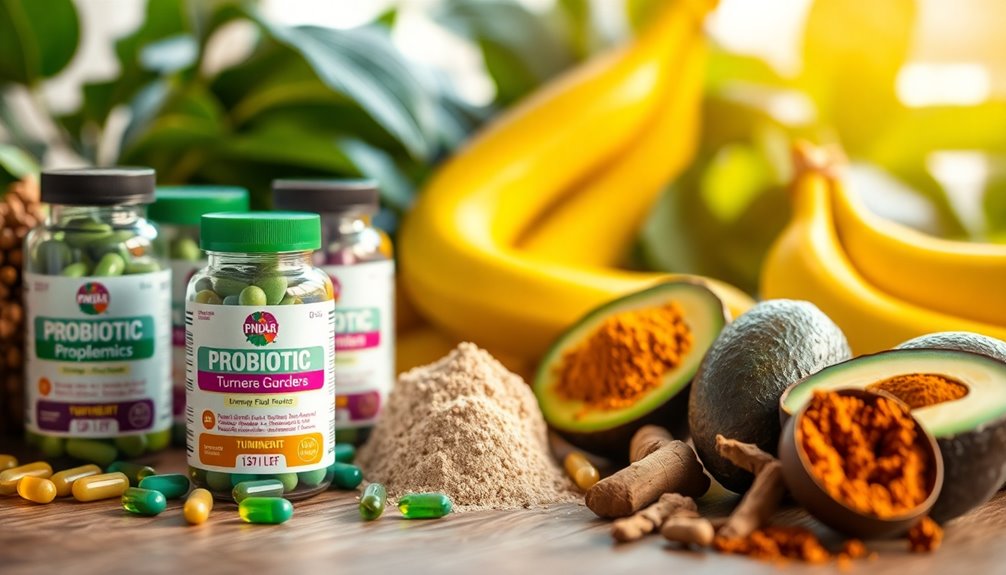You might notice signs of an unhealthy gut like bloating, gas, and fatigue. Mood swings and skin issues can also indicate a gut imbalance. If you find certain foods trigger symptoms, consider common culprits like dairy or gluten. Improving gut health often starts with dietary changes such as adding fermented foods, high-fiber fruits, and healthy fats. Probiotics and herbal supplements can also help restore balance. Additionally, managing stress and prioritizing sleep are crucial for gut health. By exploring these strategies further, you can discover even more ways to enhance your gut health and overall well-being.
Key Takeaways
- Common signs of an unhealthy gut include bloating, gas, irregular bowel movements, and food intolerances like dairy and gluten.
- Mental health issues such as anxiety and depression may indicate gut imbalance due to the gut microbiome's influence on mood.
- Skin conditions like acne and eczema can be linked to gut health, highlighting the importance of dietary changes and probiotics for improvement.
- A diverse gut microbiome promotes better immune response and reduces inflammation, emphasizing the need for stress management and healthy lifestyle practices.
- Incorporate fermented foods, high-fiber fruits and vegetables, and consult with a healthcare professional for targeted dietary changes and supplements.
Common Symptoms of Gut Imbalance

When it comes to gut health, recognizing the common symptoms of gut imbalance is vital for maintaining overall wellness. You might notice issues like bloating, gas, or irregular bowel movements. These symptoms can signal that your gut isn't functioning as it should, which can impact not just your digestion, but also other aspects of your health.
One significant area affected by gut health is hormones. An imbalanced gut can disrupt hormone production, leading to symptoms like fatigue, mood swings, or even weight gain. If you find yourself feeling more irritable or experiencing sudden cravings, your gut may be sending you a message.
Additionally, gut health plays a pivotal role in maintaining a healthy weight. An unhealthy gut can alter how your body processes food and stores fat. You may struggle with weight loss despite eating a balanced diet, which can be frustrating and discouraging. Research shows that a diverse gut microbiome promotes better metabolism and weight management, emphasizing the importance of supporting your gut health. Moreover, maintaining a healthy gut balance can also help in preventing chronic conditions like chronic kidney disease.
Digestive Issues to Watch For

Digestive issues often signal an underlying issue with your gut health, and it's crucial to pay attention to these warning signs. Your gut isn't just responsible for processing food; it also plays a vital role in your overall well-being, including the gut-brain connection. Here are some digestive issues to watch for:
- Bloating: A feeling of fullness or swelling in your abdomen after meals.
- Constipation or Diarrhea: Inconsistent bowel movements can indicate gut distress.
- Heartburn: Frequent acid reflux can indicate an imbalance in your gut flora.
- Unexplained Weight Changes: Sudden weight gain or loss might point to digestive issues at play.
If you're experiencing any of these symptoms, it's crucial to explore gut healing protocols that can restore balance. Making dietary changes, such as increasing fiber intake and including fermented foods, can greatly enhance your gut health. Additionally, the consumption of traditional bread can significantly impact gut health, leading to inflammation and digestive distress.
Additionally, managing stress through mindfulness practices can help address the gut-brain connection, as mental health and digestion are closely linked.
Impact on Mental Health

Many people don't realize the deep connection between gut health and mental well-being. This gut-brain connection is a two-way street, where the state of your gut can greatly influence your mood, anxiety levels, and overall mental health. When your gut isn't functioning properly, you may find yourself facing emotional triggers that impact your daily life.
Research indicates that a balanced gut microbiome can help regulate neurotransmitters, like serotonin, which play a vital role in mood stabilization. If your gut is unhealthy, it can lead to imbalances that may heighten feelings of anxiety or depression. You might notice that when you experience digestive issues, your mental state can also take a hit. It's not just in your head; it's a physical response linked to the health of your gut.
You might be surprised to learn that simple changes in your diet and lifestyle can positively influence this connection. Incorporating more fiber-rich foods, probiotics, and staying hydrated can nurture your gut health, potentially alleviating some emotional burdens. Additionally, practicing mindfulness and stress-reducing techniques can help manage those emotional triggers that arise from gut issues. Regularly engaging in mindfulness meditation can further enhance your mental clarity and emotional resilience.
Ultimately, nurturing your gut could lead to a more balanced and happier life. You're not alone in this journey; many are discovering the benefits of prioritizing gut health for improved mental well-being. So, take charge of your gut health, and you just might find a brighter outlook on life.
Skin Conditions Linked to Gut Health

Your skin is often a reflection of your overall health, and emerging research shows a significant link between gut health and various skin conditions. If you've been struggling with persistent skin issues, it might be time to examine your gut.
Many people experience an acne connection tied to their gut microbiome. Imbalances in gut bacteria can trigger inflammation, which often manifests as breakouts. Additionally, skin conditions like eczema can worsen without a healthy gut. Finding effective eczema remedies may involve addressing gut health, as certain gut imbalances can lead to increased skin sensitivity and irritation.
Here are some common skin conditions linked to gut health:
- Acne flare-ups after consuming certain foods
- Eczema, often exacerbated by gut inflammation
- Psoriasis, which can be influenced by gut dysbiosis
- Rosacea, potentially linked to digestive issues
Taking steps to improve your gut health can have a positive impact on your skin. Probiotics, prebiotics, and a balanced diet rich in whole foods can support a healthy microbiome. By nurturing your gut, you may find that your skin clears up, leading to a more radiant complexion and increased confidence. Additionally, following a program like the Adaptive Body Boost can enhance your overall well-being and further support skin health.
Food Intolerances and Sensitivities

A significant number of people struggle with food intolerances and sensitivities, which can wreak havoc on overall gut health. If you find yourself experiencing bloating, gas, or stomach pain after eating certain foods, it could be a sign that your gut isn't processing them well. Common culprits include dairy, gluten, and certain legumes. Identifying these triggers is essential for restoring balance and improving your well-being.
To start, consider keeping a food diary. Tracking what you eat alongside any symptoms can reveal patterns that may point to specific intolerances. Once you identify these foods, it's crucial to eliminate them from your diet for a while and observe how your body responds. This process can help reduce inflammation and promote healthier digestion.
Don't forget that gut health is interconnected with exercise and stress management. Regular physical activity not only improves digestion but also enhances your mood, which can alleviate stress—another aspect that negatively impacts gut health. In fact, studies show that mind/body techniques can effectively lower blood pressure, which is also influenced by stress levels.
Incorporating gentle exercises like yoga can be particularly beneficial, as it promotes relaxation and digestive health.
Importance of Gut Microbiome

The intricate balance of the gut microbiome plays a significant role in your overall health and well-being. Your gut is home to trillions of microorganisms, including gut bacteria that contribute to various bodily functions. When you support a diverse microbiome, you're laying the groundwork for not just digestive health but for your immune system, mental health, and even your skin.
A rich microbiome diversity means a wider range of beneficial bacteria, which can lead to:
- Enhanced nutrient absorption, ensuring your body gets what it needs from food.
- Improved immune response, aiding you in warding off infections and illnesses.
- Better mental well-being, as the gut-brain connection influences mood and cognition.
- Reduced inflammation, which is vital for preventing chronic diseases.
When your gut bacteria are out of balance, you might experience symptoms like bloating, fatigue, or even mood swings. It's crucial to recognize that a healthy gut environment isn't just about the quantity of bacteria; it's about quality and variety.
Incorporating a diverse range of foods into your diet—such as fruits, vegetables, and fermented products—can promote that microbiome diversity. Additionally, adopting a plant-based diet can enhance your overall gut health by increasing fiber intake and providing vital nutrients.
Lifestyle Factors Affecting Gut Health

Many people mightn't realize how their daily choices can greatly impact gut health. Your lifestyle habits, particularly stress management and sleep hygiene, play a significant role in maintaining a healthy gut. When you experience high levels of stress, your body produces cortisol, which can disrupt the balance of your gut microbiome. This imbalance may lead to digestive issues, inflammation, and even mood disturbances. Practicing effective stress management techniques, like mindfulness or regular physical activity, can help restore this balance and promote better gut health. Additionally, the reliance on over-the-counter pain-relievers for temporary relief of discomfort can further contribute to gut health issues.
Sleep hygiene is equally important. Poor sleep can negatively affect your gut, as it disrupts the circadian rhythm that governs many bodily functions, including digestion. Aim for 7-9 hours of quality sleep each night to help your gut thrive. Create a calming bedtime routine, limit screen time before bed, and keep your sleep environment comfortable.
Additionally, consider the impacts of your social interactions. Building strong connections with family and friends can help alleviate stress, contributing positively to gut health. Surrounding yourself with supportive individuals encourages healthier lifestyle choices, creating a positive feedback loop.
Dietary Changes for Improvement

Transforming your diet can greatly enhance gut health and overall well-being. By incorporating gut healing foods into your meals, you can foster a balanced microbiome and reduce digestive discomfort. These foods are rich in nutrients and promote the growth of beneficial bacteria, making them essential for a healthy gut.
Here are some gut healing foods you should consider adding to your diet:
- Fermented foods like yogurt, sauerkraut, and kimchi, which contain probiotics that support gut health.
- High-fiber fruits and vegetables such as apples, bananas, and leafy greens that nourish your gut bacteria.
- Whole grains like quinoa, brown rice, and oats, which provide prebiotics to feed healthy gut flora.
- Healthy fats found in avocados, olive oil, and nuts that can help reduce inflammation.
Exploring gut friendly recipes can also make dietary changes enjoyable and sustainable. Try whipping up a probiotic-packed smoothie for breakfast or a fiber-rich salad for lunch. Experimenting with new flavors and ingredients not only makes meals exciting but also helps you connect with others who share your health goals.
Supplements to Consider

Considering your gut health, supplements can play a vital role in enhancing your digestive well-being. When you're looking to improve your gut function, it's pivotal to choose the right supplements that support your body's unique needs.
One of the most effective options is probiotics. These beneficial bacteria come in various strains, each with specific health benefits. For instance, Lactobacillus and Bifidobacterium are popular probiotic strains known to help balance gut flora, alleviate bloating, and enhance overall digestion. Adding a high-quality probiotic supplement to your routine can significantly boost a healthier gut environment.
In addition to probiotics, herbal remedies are another avenue worth exploring. Herbs like ginger, peppermint, and turmeric have been shown to help soothe digestive discomfort and reduce inflammation. Incorporating herbal supplements or teas into your daily regimen can provide gentle support for your digestive system.
Moreover, considering natural supplements like NeuroPure can also support overall wellness and may contribute to a healthier gut by promoting nutrient absorption and reducing inflammation.
It's important to remember that not all supplements are created equal, so do your research and choose reputable brands. Consulting with a healthcare professional before starting any new supplement is also a wise choice, ensuring you select what's optimal for your situation.
Frequently Asked Questions
How Long Does It Take to Heal an Unhealthy Gut?
Healing your gut can vary based on several factors, but you might notice improvements within a few weeks. A gut healing timeline often spans from a few weeks to several months, depending on your lifestyle and diet. Incorporating gut health supplements can support this process, helping restore balance.
Can Stress Directly Impact Gut Health?
Did you know that around 90% of your body's serotonin is produced in the gut? This gut-brain connection means stress can directly impact your gut health. When you're stressed, it can disrupt your gut microbiome, leading to various issues.
That's why stress management is essential. By incorporating mindfulness practices or physical activity into your routine, you can help maintain a healthier gut and overall well-being, fostering a sense of belonging in your body.
Are There Specific Foods to Avoid for Gut Health?
When it comes to gut health, you'll want to steer clear of certain foods.
High sugar diets can disrupt your gut balance, promoting harmful bacteria over beneficial ones. Instead of relying solely on sugary treats, consider incorporating probiotic supplements to support your gut flora.
How Do Antibiotics Affect Gut Microbiome Balance?
Think of your gut bacteria as a vibrant garden, flourishing in harmony. When you take antibiotics, it's like a sudden storm that floods this garden, disrupting the delicate balance. Antibiotics target harmful bacteria but often wipe out beneficial ones too, leading to an imbalance.
This antibiotic impact can result in digestive issues and affect your overall well-being. Nurturing your gut with probiotics and a balanced diet can help restore that thriving ecosystem.
Is Intermittent Fasting Beneficial for Gut Health?
Intermittent fasting can offer several benefits for gut health, like improving digestion and promoting beneficial bacteria growth. Some studies suggest it plays a significant role in reducing inflammation and enhancing metabolic processes. However, it's vital to take into account possible drawbacks, such as nutrient deficiencies or overeating during eating windows.
Evaluating its effectiveness and sustainability is imperative, as not everyone may find it a suitable long-term approach. Listening to your body is crucial in making the right choice for you.
Conclusion
So, if you're feeling like a bloated balloon or your mood swings could rival a soap opera, it might be time to pay attention to your gut. Remember, ignoring those signs won't make them disappear—trust me, they're not magic! By embracing dietary changes, considering supplements, and maybe swapping that nightly ice cream for some fermented goodies, you can turn your gut health around. After all, a happy gut could mean a happier you—minus the drama!



